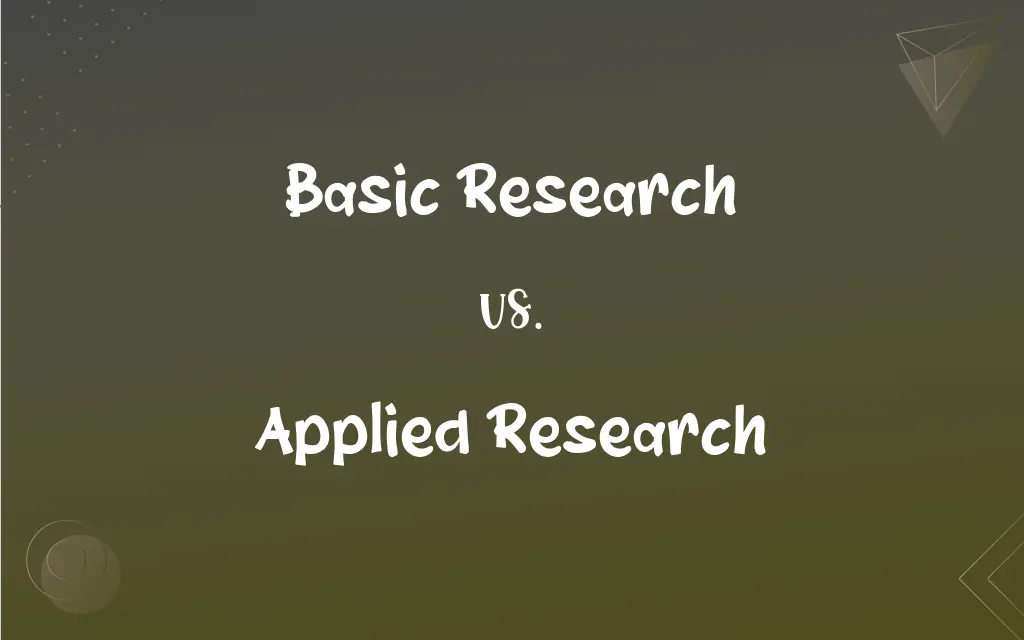Basic Research vs. Applied Research: What's the Difference?
Edited by Janet White || By Harlon Moss || Updated on October 20, 2023
Basic research seeks fundamental understanding, while applied research aims for practical solutions.

Key Differences
Basic research delves into the foundational understanding of phenomena without immediate commercial applications. Applied research, conversely, is conducted with a specific practical goal or application in mind.
In the realm of science, basic research often paves the way for discoveries that enhance our understanding of the natural world. Applied research then takes these foundational discoveries and seeks ways to use them for direct societal benefits.
When a scientist is curious about why a particular phenomenon occurs, they are venturing into basic research. However, when they want to solve a specific problem using known principles, they are entering the territory of applied research.
Universities and institutions often promote basic research to advance knowledge. In contrast, industries and businesses typically favor applied research since it can lead to new products or improved processes.
While both basic research and applied research have their distinct purposes, they are interconnected. Findings from basic research can fuel innovations in applied research, and challenges in applied research can inspire new questions in basic research.
ADVERTISEMENT
Comparison Chart
Purpose
Understand fundamental principles
Solve specific, practical problems
Outcome
Knowledge enhancement
Practical solutions or products
Typical Funding Sources
Educational institutions, government grants
Industries, businesses, specific government agencies
Timeframe for Application
Often long-term or undefined
Typically short-term to medium-term
Primary Motivation
Curiosity about a phenomenon
Addressing a particular challenge or need
ADVERTISEMENT
Basic Research and Applied Research Definitions
Basic Research
Delving into primary concepts.
Basic research in chemistry unveils the reactions at the molecular level.
Applied Research
Research targeting specific problems.
Applied research in agriculture has enhanced crop yields.
Basic Research
Investigation of foundational principles.
His work in basic research led to a groundbreaking discovery.
Applied Research
Inquiry for immediate application.
Companies invest in applied research to develop innovative products.
Basic Research
Inquiry driven by curiosity.
The lab conducted basic research on cellular functions.
Applied Research
Study aimed at practical solutions.
Their team's applied research resulted in a new water purification technique.
Basic Research
Exploration for knowledge's sake.
Through basic research, we uncover the mysteries of the universe.
Applied Research
Harnessing knowledge for real-world use.
The institute focuses on applied research in renewable energy.
Basic Research
Study without immediate application.
She was passionate about basic research, diving deep into quantum mechanics.
Applied Research
Tailoring findings for societal benefit.
Through applied research, medical treatments become more effective.
FAQs
What is basic research?
Basic research aims to understand fundamental principles without immediate practical applications.
Can applied research lead to basic research questions?
Yes, challenges in applied research can inspire new questions in basic research.
Are basic research findings useful?
Yes, while they may lack immediate applications, they often lay the groundwork for future innovations.
Where is basic research commonly conducted?
Universities and research institutions often engage in basic research.
Why is basic research important for science?
It enhances understanding and can pave the way for applied research.
Which research type is more industry-focused?
Applied research is often more aligned with industry needs and goals.
How does society benefit from applied research?
Applied research addresses societal challenges, leading to improved technologies, processes, and solutions.
Is one type of research more valuable than the other?
Both are crucial; basic research advances knowledge, while applied research addresses immediate needs.
Are there areas where both types overlap?
Yes, some research projects can encompass elements of both, especially in transitional phases.
Which is more commercially driven?
Applied research is typically more commercially driven, aiming to solve market or industry-specific issues.
Can a researcher be involved in both types?
Absolutely, many researchers engage in both basic and applied research at different times.
Do findings from basic research always lead to applied research?
Not always, but they can provide the foundation for future applied studies.
Which research type has a quicker impact?
Applied research typically yields quicker practical impacts due to its problem-solving nature.
Are the methods used different in each type?
While the scientific method underpins both, the focus and approach can differ based on the research's aim.
Can basic research lead to unexpected applications?
Yes, many foundational discoveries have led to unforeseen practical applications.
Can one exist without the other?
Both are interconnected. Basic research lays the foundation, and applied research builds upon it for practical solutions.
How does applied research differ?
Applied research is conducted with specific, practical goals or applications in mind.
Who typically funds applied research?
Industries, businesses, and specific government agencies often fund applied research.
Is basic research purely theoretical?
While it delves into foundational principles, it can involve both theoretical and experimental work.
Can applied research result in products?
Yes, applied research often leads to the development of new products or improved processes.
About Author
Written by
Harlon MossHarlon is a seasoned quality moderator and accomplished content writer for Difference Wiki. An alumnus of the prestigious University of California, he earned his degree in Computer Science. Leveraging his academic background, Harlon brings a meticulous and informed perspective to his work, ensuring content accuracy and excellence.
Edited by
Janet WhiteJanet White has been an esteemed writer and blogger for Difference Wiki. Holding a Master's degree in Science and Medical Journalism from the prestigious Boston University, she has consistently demonstrated her expertise and passion for her field. When she's not immersed in her work, Janet relishes her time exercising, delving into a good book, and cherishing moments with friends and family.































































